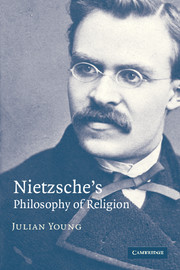Book contents
- Frontmatter
- Contents
- Acknowledgements
- List of abbreviations
- Introduction
- 1 Schopenhauer and ‘Man's Need for Metaphysics’
- 2 The Birth of Tragedy
- 3 Untimely Meditations
- 4 Human, All-too-Human
- 5 The Gay Science
- 6 Thus Spoke Zarathustra
- 7 Beyond Good and Evil
- 8 On the Genealogy of Morals
- 9 The Wagner Case
- 10 Twilight of the Idols
- 11 The Antichrist
- 12 Ecce Homo
- 13 Epilogue: Nietzsche in history
- Bibliography
- Index
4 - Human, All-too-Human
Published online by Cambridge University Press: 27 October 2009
- Frontmatter
- Contents
- Acknowledgements
- List of abbreviations
- Introduction
- 1 Schopenhauer and ‘Man's Need for Metaphysics’
- 2 The Birth of Tragedy
- 3 Untimely Meditations
- 4 Human, All-too-Human
- 5 The Gay Science
- 6 Thus Spoke Zarathustra
- 7 Beyond Good and Evil
- 8 On the Genealogy of Morals
- 9 The Wagner Case
- 10 Twilight of the Idols
- 11 The Antichrist
- 12 Ecce Homo
- 13 Epilogue: Nietzsche in history
- Bibliography
- Index
Summary
This chapter will discuss the works of Nietzsche's so-called ‘positivist’ period: Human, All-too-Human, Assorted Opinions and Maxims, The Wanderer and His Shadow, and finally Daybreak.
HUMAN, ALL-TOO-HUMAN: A BOOK FOR FREE SPIRITS
Human, All-too-Human (Menschliches, Allzumenschliches) was first published in 1878, Assorted Opinions and Maxims in 1879 and The Wanderer and His Shadow in 1880. They were all republished under the title Human, All-too-Human in 1886, with the original work of that title as volume i and the remaining two works, together with a new preface, as volume ii. In what follows I shall treat the three works as the unity Nietzsche presented them as being in 1886.
Human appeared after Nietzsche's break with Wagner and covers the time of his abandonment of the life of a university professor (he resigned from Basle with a small pension in 1879). It also marks his break with Schopenhauer whom he now treats as his ‘antipode’. In at least three ways, therefore, Human is the work of a ‘free[d] spirit’.
Here is Nietzsche's own description, in the final days of his creative life, of the circumstances in which he began to write it:
The beginning of this book belongs within the weeks of the first Bayreuth Festival; a profound estrangement from all that surrounded me there is one of its preconditions. Anyone who has any idea what visions had been flitting across my path even at the time can guess how I felt when I one day came to myself in Bayreuth.[…]
- Type
- Chapter
- Information
- Nietzsche's Philosophy of Religion , pp. 58 - 87Publisher: Cambridge University PressPrint publication year: 2006



